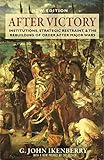After Victory : Institutions, Strategic Restraint, and the Rebuilding of Order after Major Wars, New Edition / G. John Ikenberry.
Material type: TextSeries: Princeton Studies in International History and Politics ; 161Publisher: Princeton, NJ : Princeton University Press, [2019]Copyright date: ©2019Edition: NewDescription: 1 online resource (336 p.)Content type:
TextSeries: Princeton Studies in International History and Politics ; 161Publisher: Princeton, NJ : Princeton University Press, [2019]Copyright date: ©2019Edition: NewDescription: 1 online resource (336 p.)Content type: - 9780691169217
- 9781400880843
- POLITICAL SCIENCE / Comparative Politics
- 1815 settlement
- 1919 settlement
- 1945 settlement
- APEC
- American domestic system
- American foreign policy
- American policy makers
- American power
- Cold War
- Congress of Vienna
- European governments
- League of Nations
- NAFTA
- NATO
- Napoleonic wars
- United States
- Woodrow Wilson
- abandonment
- balance of power
- constitutional order
- democracy
- democratic community
- democratic states
- dispute resolution
- domestic institutions
- domination
- global power
- hegemonic order
- institutional agreements
- institutional bargains
- institutionalized settlement
- institutions
- international institutions
- international order
- international relations
- interstate relations
- leading state
- major war
- major wars
- market liberalization
- modern history
- nondemocratic states
- order building
- organizing arrangements
- peace settlement
- political coalitions
- political liberalization
- political order
- postwar order
- postwar orders
- postwar power
- postwar settlements
- postwar states
- postwar world
- power asymmetry
- power distribution
- power management
- power
- security guarantee
- state power
- world order
- world politics
- 327.1 23
- online - DeGruyter
- Issued also in print.
| Item type | Current library | Call number | URL | Status | Notes | Barcode | |
|---|---|---|---|---|---|---|---|
 eBook
eBook
|
Biblioteca "Angelicum" Pont. Univ. S.Tommaso d'Aquino Nuvola online | online - DeGruyter (Browse shelf(Opens below)) | Online access | Not for loan (Accesso limitato) | Accesso per gli utenti autorizzati / Access for authorized users | (dgr)9781400880843 |
Frontmatter -- CONTENTS -- PREFACE TO THE NEW EDITION -- PREFACE (2001) -- ACKNOWLEDGMENTS -- Chapter One. THE PROBLEM OF ORDER -- Chapter Two. VARIETIES OF ORDER: BALANCE OF POWER, HEGEMONIC, AND CONSTITUTIONAL -- Chapter Three. AN INSTITUTIONAL THEORY OF ORDER FORMATION -- Chapter Four. THE SETTLEMENT OF 1815 -- Chapter Five. THE SETTLEMENT OF 1919 -- Chapter Six. THE SETTLEMENT OF 1945 -- Chapter Seven. AFTER THE COLD WAR -- Chapter Eight. CONCLUSION -- APPENDIX ONE -- INDEX
restricted access online access with authorization star
http://purl.org/coar/access_right/c_16ec
The end of the Cold War was a "big bang" reminiscent of earlier moments after major wars, such as the end of the Napoleonic Wars in 1815 and the end of the world wars in 1919 and 1945. But what do states that win wars do with their newfound power, and how do they use it to build order? In After Victory, John Ikenberry examines postwar settlements in modern history, arguing that powerful countries do seek to build stable and cooperative relations, but the type of order that emerges hinges on their ability to make commitments and restrain power. He explains that only with the spread of democracy in the twentieth century and the innovative use of international institutions-both linked to the emergence of the United States as a world power-has order been created that goes beyond balance of power politics to exhibit "constitutional" characteristics. Blending comparative politics with international relations, and history with theory, After Victory will be of interest to anyone concerned with the organization of world order, the role of institutions in world politics, and the lessons of past postwar settlements for today.
Issued also in print.
Mode of access: Internet via World Wide Web.
In English.
Description based on online resource; title from PDF title page (publisher's Web site, viewed 21. Jun 2021)


